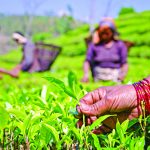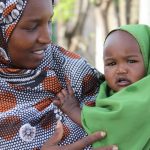USAID has been a critical partner to IFPRI and its 2020 Vision Initiative, which seeks to promote a shared vision and consensus for action to meet the world’s food needs while reducing poverty and protecting the environment. USAID has sponsored four 2020 conferences—high-level global events that have featured USAID’s leadership in dialogues, debates, information sharing, >> Read more
Preventive versus Recuperative Nutritional Intervention Approach
In the early 2000s, the joint work of USAID, the USAID- funded Food and Nutrition Technical Assistance (FANTA) project, and IFPRI influenced the global approach to nutrition interventions. Traditionally, nutrition programs administered interventions to children under age five only after they became undernourished—the recuperative approach. Although new scientific evidence was surfacing that children under the >> Read more
The Power of Agriculture to Feed the Future
Both USAID and IFPRI know that unlocking the potential of agriculture is critical to breaking the vicious cycle of hunger, malnutrition, and extreme poverty. In 2010, the US government launched Feed the Future—the country’s global hunger and food security initiative with a comprehensive approach that draws on partnerships across sectors, country leadership, and a focus >> Read more
Strengthening Partnerships, Results, and Innovations in Nutrition Globally
In 2011, USAID launched the Strengthening Partnerships, Results, and Innovations in Nutrition Globally (SPRING) project to scale up high-impact nutrition practices and policies from different countries. With assistance from IFPRI, SPRING provides governments with state-of-the- art technical support focused on preventing stunting and maternal and child anemia in the first 1,000 days, linking agriculture and >> Read more
Ethiopia Strategy Support Program
At the request of the Government of Ethiopia, USAID and IFPRI, with support from the UK Department for International Development (DFID), the Canadian International Development Agency, the Netherlands, and Irish Aid launched the Ethiopia Strategy Support Program (ESSP), the first CSSP, in 2004. ESSP is a collaborative program between IFPRI and the Ethiopian Development Research >> Read more
The Gender Factor: Understanding the Impact of Empowering Women
Women make up about 43 percent of the agricultural workforce in many developing countries, positioning them in a critical and transformative role in agricultural growth, food and nutrition security, and poverty reduction. Women also play an important role within their families as income earners and caregivers. In 2010, USAID approached IFPRI and the Oxford Poverty >> Read more
Malawi Strategy Support Program
In Malawi, USAID and IFPRI launched the Malawi Strategy Support Program (MaSSP) in 2009 to collaborate with the Ministry of Agriculture and Food Security in reaching the country’s agricultural, food security, and poverty reduction goals. Challenges to Soya Export Promotion, a recent examination of the soya export sector by MaSSP, motivated a review and current revision of the Control >> Read more
CGIAR Research Program on Agriculture for Nutrition and Health (A4NH)
The CGIAR Research Program on Agriculture for Nutrition and Health (A4NH) is led by IFPRI with six other managing partners and is funded by USAID and other donors. Launched in 2012, A4NH seeks to realize the enormous potential of agricultural development to improve nutrition and health worldwide, while placing strong emphasis on gender and >> Read more
HarvestPlus: Biofortification
Since the founding of HarvestPlus, a joint venture by IFPRI and the International Center for Tropical Agriculture (CIAT), USAID has been an important partner in addressing “hidden hunger”—malnutrition caused by micronutrient deficiencies—by breeding high levels of micronutrients into staple crops through a process called biofortification. HarvestPlus has successfully improved access to biofortified crops, resulting in >> Read more
Program for Biosafety Systems
Advancements brought by biotechnology—namely, improved crop varieties—have been known to enhance agricultural innovation, productivity, and farmers’ incomes. To support countries in Africa and Asia in the responsible development and use of biotechnology, USAID and IFPRI launched the Program for Biosafety Systems (PBS) in 2003. Since then, PBS has been providing technical support, legal analysis, and >> Read more
- « Previous Page
- 1
- 2
- 3
- 4
- …
- 22
- Next Page »






